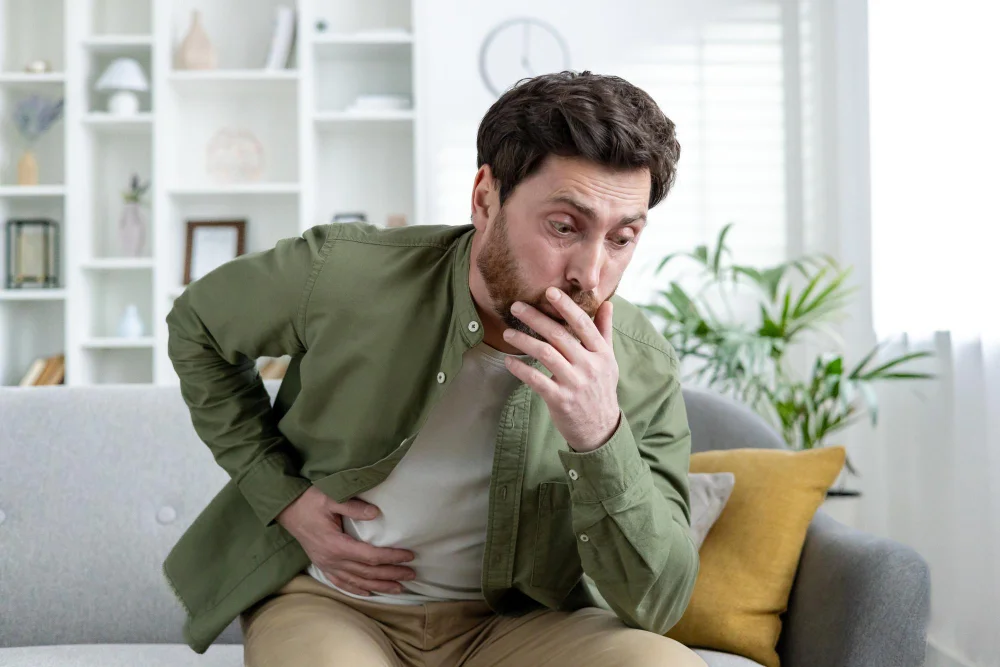Have you ever noticed a sharp or dull abdominal pain while coughing and wondered what it means? While it is common to feel a bit of muscle strain when you cough hard, persistent or severe pain in the abdomen should not be ignored. It could indicate anything from simple muscle fatigue to more serious issues like hernias or infections.
In this detailed guide, we’ll explain why you might experience abdominal pain while coughing, explore the most common causes, possible treatments and when it’s time to see a doctor.
Understanding Abdominal Pain While Coughing
When you cough, your abdominal muscles contract suddenly to push air out of your lungs. This pressure helps clear mucus, irritants or infections from your airways. However, this same pressure can also strain your abdominal muscles and organs, leading to abdominal pain while coughing.
The pain can appear in different forms — it may be sharp, dull, cramping or burning and can occur in various parts of your abdomen such as the lower, upper or side region. Sometimes, it’s only mild discomfort, while in other cases it might feel severe enough to interrupt your daily activities.
Occasional abdominal pain is often harmless, but if it persists for days or worsens, it may point to an underlying medical condition that needs attention.
Is Abdominal Pain While Coughing Serious?
In most cases, abdominal pain is due to muscle strain or overuse, especially if you’ve been coughing repeatedly because of a cold, flu or bronchitis. However, pain that persists or is accompanied by other symptoms like swelling, fever, nausea or vomiting could be a sign of something more serious.
Certain medical conditions such as hernia, appendicitis, gallstones or urinary tract infections can also cause pain that worsens when you cough. If the pain becomes intense or you notice a bulge in your abdomen, it’s best to consult a doctor immediately.
Common Causes of Abdominal Pain While Coughing
Let’s explore the most frequent reasons behind abdominal pain while coughing and what each might indicate.
1. Muscle Strain
One of the most common causes of abdominal pain while coughing is muscle strain. Continuous coughing can overwork or even slightly tear the abdominal muscles. This can lead to soreness, tenderness or sharp pain especially when you cough, sneeze or laugh.
If you’ve had a bad cold or respiratory infection and have been coughing for several days, your abdominal muscles are likely fatigued, just like after an intense workout. Rest and gentle stretching usually help the pain subside.
2. Hernia
A hernia develops when an inside organ pushes through a weak area in your abdominal wall. Coughing increases intra-abdominal pressure, which can make the hernia bulge out more and cause abdominal pain.
The most common types include inguinal hernia (groin area), umbilical hernia (around the navel) and hiatal hernia (upper abdomen).
Symptoms may include:
- A visible bulge in the abdomen or groin
- Pain or discomfort when coughing, lifting or bending
- A heavy or dragging sensation in the lower abdomen
If you suspect a hernia, it’s essential to get evaluated, as untreated hernias can lead to complications like intestinal obstruction or strangulation.
3. Appendicitis
Appendicitis is another potential cause of abdominal pain while coughing, especially when the pain is located in the lower right side of the abdomen. The appendix becomes inflamed and any increase in abdominal pressure such as coughing or sneezing can intensify the pain.
Typical symptoms:
- Sharp pain in the lower right abdomen
- Nausea, vomiting and loss of appetite
- Fever and abdominal swelling
Appendicitis is a medical emergency and needs immediate surgical treatment to prevent rupture.
4. Cough-Related Muscle Tear or Abdominal Wall Injury
Severe or chronic coughing can sometimes lead to small muscle tears or even injury to the abdominal wall. This is more common in people who smoke, have chronic bronchitis or experience violent coughing spells.
In such cases you might feel a sudden, sharp abdominal pain or notice localized swelling or bruising. Medical evaluation can rule out deeper muscle injury or hernia formation.
5. Gallbladder Problems
People with gallstones or gallbladder inflammation (cholecystitis) may also experience abdominal pain while coughing, especially in the upper right abdomen. Coughing can worsen the discomfort because it causes the abdominal muscles to tighten, pressing against the inflamed organ.
Other symptoms include:
- Pain after fatty meals
- Nausea or vomiting
- Pain radiating to the right shoulder or back
If these symptoms occur, medical attention is important, as untreated gallbladder problems can lead to infection.
6. Lung or Rib-Related Issues
Sometimes, abdominal pain while coughing doesn’t actually originate from the abdomen but from nearby structures such as the lungs or ribs. Conditions like pleurisy (inflammation of lung lining), pneumonia or rib fractures can cause referred pain that feels like it’s coming from the abdomen.
This type of pain typically increases with deep breaths, coughing or movement and might be accompanied by shortness of breath or chest discomfort.
7. Gastrointestinal Issues
Digestive conditions such as gas, bloating, acid reflux, irritable bowel syndrome (IBS) or gastritis can also cause discomfort that worsens when you cough. The increased pressure in the abdomen during coughing can irritate the stomach or intestines, making you feel a sharp abdominal pain while coughing.
8. Post-Surgery or Postpartum Pain
If you’ve recently had abdominal surgery (like a C-section, appendectomy or hernia repair) or given birth, your abdominal muscles and tissues are still healing. Coughing during this recovery period can strain the healing tissues and cause pain or discomfort. In such cases, supporting your abdomen with a pillow while coughing can help ease the pain.
When to Worry About Abdominal Pain While Coughing?
While occasional pain might not be alarming, you should see a doctor if you notice:
- Persistent or worsening abdominal pain
- Pain accompanied by fever, vomiting or bloating
- A visible bulge or swelling in your abdomen
- Pain that spreads to your chest, back or groin
- Difficulty breathing or severe coughing spells
These symptoms may indicate an underlying issue like hernia, infection, appendicitis or gallbladder disease that needs medical attention.
Diagnosis: How Doctors Find the Cause?
If you visit a doctor for abdominal pain, they’ll start by taking a detailed history of your symptoms like where the pain is located, how long it has lasted and any associated symptoms.
They may perform a physical exam to check for muscle tenderness, swelling or hernia bulges. Depending on your symptoms, tests may include:
- Ultrasound or CT scan to detect hernias, gallstones or appendicitis
- Blood tests to look for infection or inflammation
- X-rays if lung or rib problems are suspected
Accurate diagnosis is very crucial to ensure the right treatment.
Treatment Options for Abdominal Pain While Coughing

The treatment for abdominal pain depends on the underlying cause. Some cases resolve on their own with rest, while others may require medication or surgery.
1. Rest and Gentle Care
If your pain is due to muscle strain, taking rest and avoiding heavy lifting or coughing fits helps the muscles recover. Applying a warm compress can ease stiffness.
2. Cough Management
Treating the cough itself is key. Over the counter cough suppressants, throat lozenges or steam inhalation can help reduce coughing frequency and ease abdominal pressure.
3. Pain Relief
Non-prescription pain relievers like paracetamol or ibuprofen (only after consulting a doctor) can help reduce discomfort and inflammation.
4. Treating the Underlying Condition
- For hernias, surgical repair may be needed.
- For appendicitis, emergency surgery (appendectomy) is the standard treatment.
- For gallstones or infections, medications or surgery may be prescribed.
- For lung related causes, antibiotics or anti-inflammatory medicines can help depending on diagnosis.
Prevention Tips
While not all causes can be prevented, certain habits can reduce your risk of abdominal pain:
- Stay hydrated and avoid smoking to prevent chronic cough.
- Strengthen your abdominal core with light exercises.
- Avoid lifting heavy objects improperly.
- Eat a healthy diet to prevent gallstones and constipation.
- Support your abdomen with a pillow when coughing after surgery.
When to See a Doctor Immediately
Seek immediate medical attention if you experience:
- Sudden, severe abdominal pain while coughing
- Persistent vomiting or fever
- Blood in vomit or stool
- A hard, swollen abdomen
- Fainting or dizziness with pain
These could indicate serious conditions like appendicitis, internal bleeding or hernia complications.
Medically Reviewed by:
Dr. Sachin Kasie, MD, DNB (Gastroenterology)
Consulting Medical Gastroenterologist – Basaveshwar Hospital, Hulsur Dist Bidar
Conclusion
Experiencing abdominal pain while coughing can range from mild muscle strain to serious medical problems like hernia or appendicitis. Most mild cases resolve with rest, hydration and cough management but persistent or severe pain should never be ignored.
If the pain continues or is accompanied by other worrying symptoms, consult a doctor to find the root cause. Early diagnosis and timely treatment can prevent complications and bring faster relief.
Remember, your body often signals when something is wrong so pay attention when it speaks, even through a cough and a twinge of pain.
Frequently Asked Questions
1. How to tell if abdominal pain is muscular or internal?
Muscular pain often feels localized, sore, or tender and may worsen when you move, laugh, or cough. It usually improves with rest and heat. Internal pain, however, may feel deeper, sharper, or constant, and is often accompanied by other symptoms like nausea, fever, or bloating.
2. How to relieve abdominal pain?
Relief depends on the cause. For muscular pain, rest, gentle stretching, and warm compresses can help. For digestive issues, drink plenty of fluids, avoid heavy or spicy foods, and try mild pain relievers after consulting a doctor. If your abdominal pain is due to infection, hernia, or organ inflammation, medical treatment will be necessary.
3. Do abdominal strains hurt when you cough?
Yes, abdominal strains typically cause pain or tightness that worsens when you cough, sneeze, or move suddenly. The pain usually feels localized, and the area might be tender to touch. Proper rest and avoiding strain are essential to allow healing and prevent worsening of abdominal pain
4. Can coughing too much cause a hernia?
Yes, chronic or violent coughing can increase abdominal pressure and weaken your muscle wall, eventually causing a hernia. People who smoke or have long-term respiratory infections are at higher risk of developing hernias.
5. Is abdominal pain while coughing dangerous?
Most of the time, mild abdominal pain is not dangerous and may fade as your cough improves. But if you experience swelling, severe pain, fever, nausea, or notice a bulge in your abdomen, you should seek medical advice immediately.


